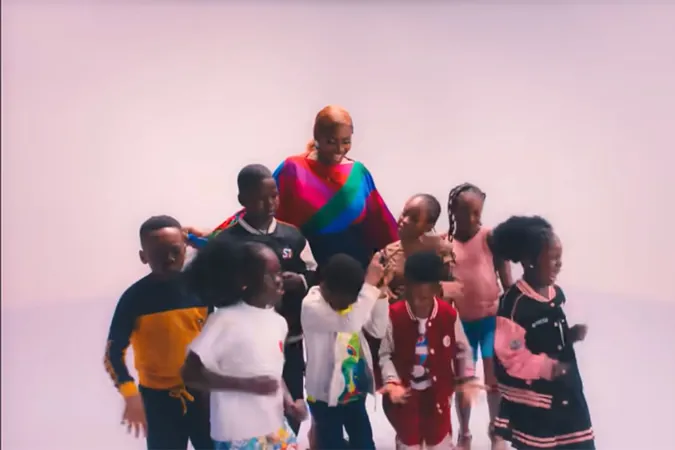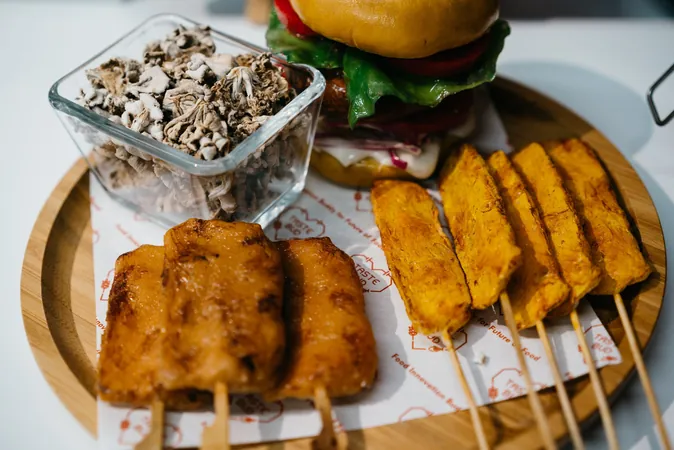
How a Catchy Pop Song is Revolutionizing Immunization Awareness in Nigeria
2024-12-05
Author: Rajesh
In Nigeria, a catchy pop song is making significant strides in shaping public attitudes towards child immunization. This remarkable cultural phenomenon began on a steamy November evening in Damboa, a bustling town near Maiduguri, the heart of Borno State. Halimat Jatau, a 29-year-old mother, found herself swaying to the beat of a song streaming from a local radio station, unaware of the profound impact it would have on her perspective towards her daughter Aisha’s health.
"I love this song! It brings some comfort from the heat, but more importantly, it reminds me of the significance of immunizing my child," Jatau expressed, enlightening her peers about prioritizing vaccinations. Her journey took a transformative turn when she first heard the song playing on her husband's radio—a track adorned with the vocals of Ali Nuhu, a celebrated Nollywood star from northern Nigeria.
Jatau admitted her oversight. Despite having three-year-old Aisha, she had never taken her for routine vaccinations. Years of misinformation had sown seeds of doubt and fear in her mind, but the song's familiar tune and the endorsement from a beloved celebrity changed that narrative. "Ali Nuhu knows what's best for our children," she said. "After hearing him advocate for immunization, I'm convinced and committed to taking Aisha for her vaccinations."
The anthemic track, titled "No More Zero Dose," was launched on October 24, coinciding with World Polio Day. Created by UNICEF, the song aims to highlight the urgent reality of "zero-dose" children—those who haven’t received even their first vaccination—thus exposing them to preventable diseases.
Produced by the renowned Cobhams Asuquo, the song features an impressive lineup of West and Central African artists, including Spyro, Kate Henshaw, Omawumi, and Cameroonian rapper Stanley Enow. With infectious lyrics emphasizing phrases like "Every child deserves attention" and "Let's leave no one behind," the catchy tune has reached well beyond the airwaves, establishing itself as a staple in markets and community gatherings across Nigeria.
Sufiyat Isah, another mom from Sokoto State, echoed Jatau's sentiments, noting, "I can't believe I've neglected my children's immunization. Hearing this song has lit a spark in me to change that." The track is further amplified by community health workers who broadcast it via portable speakers during outreach programs, driving home the importance of vaccinations.
Despite its recent debut, the song is resonating culturally with over 1.3 million views on YouTube and countless spins across social media platforms. The World Health Organization (WHO) has flagged Nigeria as having a dire situation, pointing out over 2.2 million zero-dose children as of 2021. In collaboration with Gavi, the Vaccine Alliance, and other stakeholders, the Nigerian government is striving to provide immunization services nationwide.
Rajat Madhok, Chief of Communication at UNICEF Nigeria, praised the song's immediate impact. "The early reception indicates that both the song and its message are resonating positively within communities," he stated, emphasizing the importance of collective effort in advocating for immunization.
At the song's launch in Maiduguri, officials highlighted its potential as a powerful tool to combat misinformation and drive vaccination rates higher—especially in regions severely affected by health care deficits. Dr. Gerida Birukila, UNICEF Chief for Maiduguri, revealed statistics that alarmingly note 21% of children in Borno have never been vaccinated.
Prominent figures involved in the song advocate for using their platforms to affect social change. Cobhams Asuquo passionately remarked, "Music is a tool for transformation; it is our duty to ensure that it delivers impactful messages that champion children's health."
With educational versions of the song being circulated in multiple Nigerian languages, its ambition is not just to entertain but to enlighten. Health experts like Professor Ben Onankpa assert that such initiatives are vital in dispelling the myths surrounding vaccinations.
"Every child vaccinated saves a generation from potentially devastating diseases,” he opined, outlining the broader impact of this initiative.
As the music continues to spread, one can only hope that the vibrant melody accompanying this significant public health message will lead to a healthier, safer future for Nigeria's children. The resonating question remains—can a song truly change vaccination outcomes? With the powerful cultural shift unfolding, the answer appears promising.




 Brasil (PT)
Brasil (PT)
 Canada (EN)
Canada (EN)
 Chile (ES)
Chile (ES)
 España (ES)
España (ES)
 France (FR)
France (FR)
 Hong Kong (EN)
Hong Kong (EN)
 Italia (IT)
Italia (IT)
 日本 (JA)
日本 (JA)
 Magyarország (HU)
Magyarország (HU)
 Norge (NO)
Norge (NO)
 Polska (PL)
Polska (PL)
 Schweiz (DE)
Schweiz (DE)
 Singapore (EN)
Singapore (EN)
 Sverige (SV)
Sverige (SV)
 Suomi (FI)
Suomi (FI)
 Türkiye (TR)
Türkiye (TR)